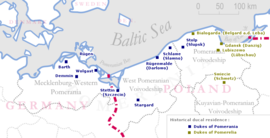Our website is made possible by displaying online advertisements to our visitors.
Please consider supporting us by disabling your ad blocker.
Pomerania
Pomerania
| |
|---|---|
Historical region | |
| |
 Contemporary administrative units with Pomerania in the name, not representing the exact historical region, as they also include parts of other regions | |
| Coordinates: 54°17′N 18°09′E / 54.29°N 18.15°E | |
| Countries | Poland Germany |
| Largest cities | in Poland: Gdańsk, Szczecin in Germany: Greifswald, Stralsund |
| Demonym | Pomeranian |
| Time zone | UTC+1 (CET) |
| • Summer (DST) | UTC+2 (CEST) |
| Primary airports | Gdańsk Lech Wałęsa Airport Solidarity Szczecin–Goleniów Airport |
| Highways | |
Pomerania (Polish: Pomorze [pɔˈmɔʐɛ] ; German: Pommern [ˈpɔmɐn] ; Kashubian: Pòmòrskô; Swedish: Pommern) is a historical region on the southern shore of the Baltic Sea in Central Europe, split between Poland and Germany. The central and eastern part belongs to the West Pomeranian, Pomeranian and Kuyavian-Pomeranian voivodeships of Poland, while the western part belongs to the German states of Mecklenburg-Western Pomerania and Brandenburg.
Pomerania's historical border in the west is the Mecklenburg-Western Pomeranian border Urstromtal,[a] which now constitutes the border between the Mecklenburgian and Pomeranian part of Mecklenburg-Western Pomerania, while it is bounded by the Vistula River in the east. The easternmost part of Pomerania is alternatively known as Pomerelia, consisting of four sub-regions: Kashubia inhabited by ethnic Kashubians, Kociewie, Tuchola Forest and Chełmno Land.
Pomerania has a relatively low population density, with its largest cities being Gdańsk and Szczecin. Outside its urban areas, it is characterized by farmland, dotted with numerous lakes, forests, and small towns. In the west of Pomerania lie several islands, the largest of which are Rügen, the largest island in Germany; Usedom/Uznam, and Wolin, the largest island in Poland. The region has a rich and complicated political and demographic history at the intersection of several cultures.
Cite error: There are <ref group=lower-alpha> tags or {{efn}} templates on this page, but the references will not show without a {{reflist|group=lower-alpha}} template or {{notelist}} template (see the help page).
Previous Page Next Page









